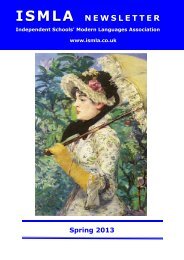Summer 2013 - The Independent Schools' Modern Language ...
Summer 2013 - The Independent Schools' Modern Language ...
Summer 2013 - The Independent Schools' Modern Language ...
Create successful ePaper yourself
Turn your PDF publications into a flip-book with our unique Google optimized e-Paper software.
angle when treated alongside L’Argent de poche<br />
and two cinematic representations of the Occupation<br />
are portrayed as meetings of ‘the personal’<br />
and ‘the historical’. <strong>The</strong> bibliographies are exhaustive<br />
but the essays alone provide Sixth Form<br />
teachers with ample material to teach these films.<br />
Pupils will find the essays accessible yet exhaustive<br />
and they could equally use them as a stepping<br />
stone to reading about cinema in French.<br />
Vanderschelden has deliberately picked ‘suitable<br />
set texts for a wide range of academic courses’<br />
that ‘can be studied in different educational contexts’<br />
and there are some exciting choices. Agnès<br />
Varda’s Sans toit ni loi alone explores the themes<br />
of social exclusion, homelessness, social responsibility,<br />
youth and the limits of freedom. Le Grand voyage beautifully depicts<br />
the realities of a second generation immigrant existence through a moving<br />
road trip. Eyebrows might be raised at the prospect of showing scenes from<br />
Christopher Gan’s Le Pacte des loups but boys, especially, love this film and it<br />
might prove an original and engaging way to introduce the concepts of legend,<br />
the Enlightenment or pre-revolution France, for instance, at the end of<br />
term. Certainly, Vanderschelden’s essay demonstrates the film’s potential as<br />
a topic for an A Level or Pre U oral presentation. Equally, the chapter Traits<br />
and Traditions in French Film Comedy suggested to me the value of showing<br />
a film like Le Dîner de cons as a prologue to teaching, say, a Molière text. A<br />
recent Year 10 trip to see Le Bourgeois gentilhomme in Paris demonstrated to<br />
me that although the ‘developed drama conventions for situation comedy,<br />
farce and slapstick’ may have ‘now been written into the specific national<br />
identity’ in France, they need to be taught elsewhere; sadly, for our pupils,<br />
the exaggerated, physical production was simply unsophisticated out of context.<br />
Doubtlessly, a country’s cinematic output is a way into other elements of its<br />
culture and, given the paucity of screenings of French films in Britain outside<br />
of London’s art house venues, it is often up to <strong>Language</strong>s departments to fill<br />
the void. Serge Kaganski defines French auteur cinema as providing a ‘better<br />
understanding of the world [and] the discovery of its reality’, furnishing<br />
French teachers with the perfect excuse to stock up their library of films.<br />
Vanderschelden’s essays are a great place to find inspiration and, even if you<br />
are not convinced by her choice of titles, following the format of one of her<br />
chapters to build up materials for any film that you are studying will ensure a<br />
successful scheme of work.<br />
Davina Suri North London Collegiate School<br />
26



